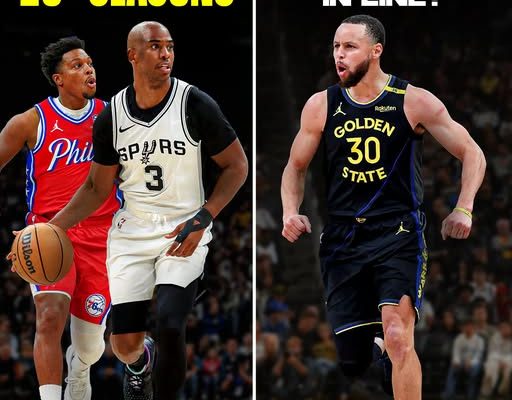The NBA has long been a league where greatness is measured not just by stats, rings, or highlight reels, but also by longevity. Very few players, especially point guards, manage to carve out 20-year careers in the league. The nature of the position — requiring relentless court vision, blazing speed, quick lateral movement, and mental precision — often results in bodies breaking down or effectiveness tapering off well before the two-decade mark. But there’s a very short list of elite floor generals who’ve defied the odds, playing at a high level for 20 seasons or more. Among them, Chris Paul and Kyle Lowry have recently joined that exclusive club. Now, another generational point guard may be set to join their ranks: Stephen Curry.
When Stephen Curry entered the NBA in 2009, he was widely considered a risky pick at seventh overall by the Golden State Warriors. Questions about his durability, his size, and his ability to adapt to the NBA’s physical style of play lingered. He was coming off a stellar collegiate career at Davidson, but many weren’t convinced his finesse-based game would translate well at the pro level. Fast-forward to 2025, and Curry is not only one of the most accomplished point guards in league history, but he also stands at the edge of something even more rare: the possibility of playing 20 seasons in the NBA.
Curry is currently entering his 17th NBA season. He’s 37 years old, but his production and impact have not noticeably diminished. In fact, when healthy, he remains one of the most dangerous offensive players in the league. The Golden State Warriors continue to be built around his transcendent shooting, off-ball movement, and basketball IQ. While his running mates like Klay Thompson have moved on and Draymond Green’s body shows signs of wear, Curry has maintained his form, adapting his game subtly to account for the inevitable effects of age. His minutes are being managed more cautiously, and the team’s offensive system now includes mechanisms to reduce the heavy load he once carried nightly. But the threat he poses is still very real, and his fitness and skillset suggest he’s not nearing retirement just yet.
When examining the idea of Curry playing 20 seasons, one must consider what it takes for a point guard to endure two full decades in the NBA. Chris Paul, for instance, reached the milestone with a game that aged gracefully. Paul, known as the “Point God,” leaned heavily on mid-range shooting, high basketball IQ, leadership, and pace control. Even as his speed declined, his ability to orchestrate an offense and play stout defense allowed him to contribute meaningfully. Kyle Lowry, meanwhile, had to adapt from a rough-and-tumble physical style to a more strategic veteran presence in Miami, where his shooting and leadership proved crucial. For both players, understanding the evolution of their own games was critical to reaching the 20-year benchmark.
Stephen Curry’s case is unique. He is not just a facilitator or a catch-and-shoot specialist. He redefined the game with his limitless range, ability to hit off-balance threes, and revolutionized how defenses have to stretch themselves to defend him. Even when he’s not scoring, his gravity bends defenses in ways few players in history can match. As he ages, this gravitational pull won’t vanish. Defenders will still chase him through screens and overextend coverage well beyond the arc. This reality alone gives Curry a strategic advantage in aging gracefully. He doesn’t rely solely on athleticism or brute force — his success is tied to skill, conditioning, and understanding of the game. All three of those are still peaking or at worst plateauing.
From a physical standpoint, Curry has taken steps to elongate his career. Early in his career, ankle injuries nearly derailed his trajectory. But following multiple surgeries and a total overhaul of his training, movement mechanics, and strength routine, he’s emerged as one of the most durable point guards in the league. While he has had some injuries — including the occasional hand or foot issue — he hasn’t suffered a catastrophic injury in nearly a decade. The credit goes to both the Warriors’ training staff and Curry’s own relentless commitment to physical maintenance.
Another important factor is Curry’s mindset. Unlike some stars who mentally check out after reaching the mountaintop, Curry remains fiercely competitive. He still chases championships, still holds himself to a high standard, and remains the engine of the Warriors franchise. His leadership, positivity, and humility have earned him respect not just from teammates and coaches, but from rivals and fans alike. Players who have that level of love for the game — and who still burn with a desire to compete — are usually the ones who find ways to stay on the court longer than expected.
There is also the broader context of NBA evolution to consider. The league today is more conducive to long careers than ever before. Load management, sports science, travel protocols, and team medical staff investments all combine to help players extend their primes. Furthermore, the reduced physicality of the modern game — particularly compared to the 1980s or even early 2000s — means players are less likely to wear down from constant contact and hard fouls. For someone like Curry, who doesn’t live in the paint or absorb contact driving to the rim, this evolution plays in his favor. As the NBA game continues to tilt toward pace, space, and shooting, Curry’s skillset will only continue to be in demand.
The Warriors organization itself has built an environment that promotes player longevity. Golden State has been one of the most forward-thinking franchises in sports science and load management. They’ve protected their stars, invested in world-class training facilities, and created a team culture that emphasizes both competition and rest. This infrastructure, combined with Curry’s trust in the front office and medical team, makes it even more likely that he could play through the 2028-2029 season — which would mark his 20th year.
Of course, the question isn’t just whether Curry can play that long. It’s whether he will want to. After all, he has nothing left to prove. He’s a four-time NBA champion, two-time MVP, NBA Finals MVP, and widely regarded as the greatest shooter in basketball history. His legacy is secure, and even if he retired tomorrow, his Hall of Fame induction would be a mere formality. But Curry seems driven by more than accolades. He talks often about playing the game the right way, mentoring younger players, and being a part of basketball’s evolution. He also values family and faith, and it’s possible he may step away early to spend more time with his wife and children. But as of now, there’s no sign of him slowing down or losing the passion.
If Curry does indeed make it to 20 seasons, it won’t just be a personal milestone. It will also solidify his place in an extremely rare echelon of NBA point guards who combined excellence with endurance. Paul and Lowry are great company, but Curry’s journey would stand apart even among them. He would be the first point guard to maintain MVP-level offensive gravity across two full decades — not as a role player, not as a ceremonial veteran, but as a foundational force.
Moreover, his doing so would send a powerful message about what is possible for skill-based players who take care of their bodies and remain mentally locked in. The idea that guards need to rely on speed and explosiveness to succeed — and thus burn out by year 15 — would be further challenged. Curry’s path could inspire a new generation of young guards to prioritize shooting, footwork, and longevity-focused habits early in their careers.
It’s also worth considering how Curry’s potential 20th season would coincide with the evolution of the Warriors franchise. Will they still be contenders? Will new young stars have emerged to share the burden? Could Curry take on more of a mentor and facilitator role, like Tim Duncan did in his final Spurs years? That scenario — where Curry is both contributing and teaching — could be a fitting end to a remarkable career.
While 2028 may feel like a long way off, the signs all point to Curry being very capable of making the journey. He remains productive, motivated, and beloved — all essential ingredients to longevity in a high-pressure sport. His teammates trust him, his organization supports him, and his body continues to respond to the demands of elite competition.
If he plays through his 20th season, he’ll not only join Paul and Lowry in that elusive club, but he might also emerge as the crown jewel among them — the player who didn’t just last but dominated. That would be the ultimate testament to Curry’s uniqueness. A 20-year career as a point guard legend isn’t just a possibility for Stephen Curry. It’s beginning to look like the next logical chapter in his already iconic basketball story.



